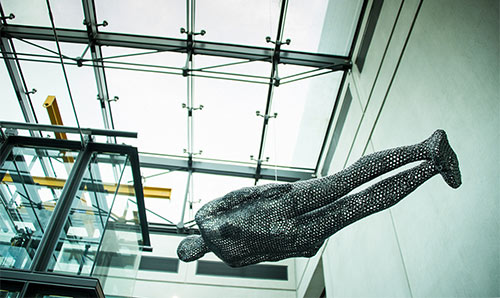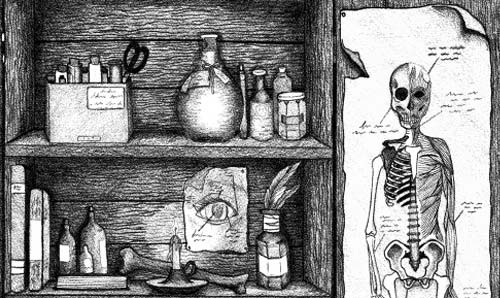Case studies
Some examples of the projects we're working on with organisations.
Culture Metrics project
A shared approach to measuring quality
Our Institute for Cultural Practices (ICP) is the research partner in this sector-led project. Culture Metrics aims to create a standardised and aggregatable metric system which measures what the cultural sector believes are the key dimensions of quality.
Collaborating institutions: Cornerhouse (lead partner, now HOME), The Royal Exchange Theatre, Contact Theatre, The Manchester Museum, Manchester Art Gallery, Halle Concerts Society, Imperial War Museum North, the Whitworth, Manchester Jazz Festival, Centre for Chinese Contemporary Art, Octagon Theatre Bolton, Oldham Coliseum Theatre, Manchester Literature Festival, P Pracsys and Intelligence Agency.

The project deals primarily with the measurement of intrinsic impact of arts on culture around a standardised set of definition and metrics. The technologies applied to this project take advantage of recent advances in mobile applications and web-served databases. By gathering real-time intrinsic impact data from artists, peers and the public; and combining it with traditional instrumental data such as attendances, funding and box office; and secondary demographics of audiences and communities of interest, it is possible to deliver comprehensive value analysis and reporting on a continuous basis. This has the potential to augment and possibly replace existing periodic application and acquittal processes for arts funding of all types.
By harnessing the power of the network and technology platforms, the project aims to create high volume, high velocity data on the impact of our work that will have high credibility and relevance to the arts sector as well as our peers and funders, the public, and the policy and academic community. The lead researchers are Dr Abi Gilmore and Dr Kostas Arvanitis with funding from the Digital R&D Fund for the Arts: Big Data.
Theatre of Debate project
Theatre of Debate is a 5 year programme (2011-16) run by Y Touring Theatre Company which aims to stimulate debate amongst young people about ethical issues raised by scientific research using a combination of theatre and digital media. The University's Institute for Cultural Practice (ICP) is part of a collaborative group with the Centre for Educational Research, University of Derby, Isinglass Consultancy.
The interdisciplinary team is researching the impact of the programme on young people, schools and teachers. ICP's research on this project is connected to Dr Simon Parry's broader work on the role of theatre and performance in mediating public engagement with contemporary science which was initiated in the Creative Encounters programme and documented in a book published by the Wellcome Trust.
- Theatre of Debate website
- Institute for Cultural Practices (ICP)
- Centre for Educational Research, University of Derby
- Wellcome Trust
The Medicine Cabinet project

During the academic year 2015-16, staff and students from the Faculties of Humanities and Life Sciences collaborated with the Museum of Medicine and Health (MMH), the University of Manchester Historian and Heritage Manager and Chetham's Library to develop a series of public engagement activities that aimed to engage different audiences with the MMH's collection of medical and healthcare objects. This work was led by Dr Kostas Arvanitis (School of Arts, Languages and Cultures), Dr Carsten Timmermann (CHSTM) and Stephanie Seville (Heritage Assistant, MMH) and funded by the Faculty of Humanities and the Wellcome Trust Institutional Strategic Support Fund. Hundreds of people engaged with stories of medical objects via two one-day events and a social media campaign, raising public awareness of the rich medical heritage of the University and offering local audiences and visitors an opportunity to find out more about the fascinating collection of MMH.
More about The Medicine Cabinet:
- Institute for Cultural Practices student projects
- MEDHUMLAB - the Medical Humanities Laboratory
- Mancunian Matters exhibition article
The Manchester Art Museum Online project

Working with 42nd Street, Manchester Art Gallery and Belle Vue Productions, Professor Helen Rees Leahy led a project to create an online exhibition of the Manchester Art Museum, which was located in Ancoats Hall, Manchester, from 1886-1953.
The Museum's founder, Thomas Horsfall, was convinced not only of the social and individual benefits of access to art, but of its 'necessity' for personal and social development, particularly in an industrial city where many people had little contact with nature or daily experience of visual beauty.
The Manchester Art Museum survives through its archival traces and extant collections; this material is mainly dispersed across collections in Manchester and beyond. Professor Rees Leahy is working with each of these institutions to collate and digitise selected materials from their respective holdings, including images of artworks, spaces and displays, with the aim of curating and interpreting these fragmentary objects in an online museum space.
The Manchester Art Museum Online will also provide an educational and creative resource for users of a new project space, The Horsfall, currently being developed by 42nd Street, a mental health charity for young people based in Ancoats.
Art for All: Exploring the Legacies of Thomas Horsfall at Manchester Art Gallery
In 2014, Rees Leahy and Belle Vue Productions made a film at Manchester Art Gallery about the legacies of Thomas Horsfall and the Manchester Art Museum in contemporary gallery practice.
The Role of Business in Humanitarian Relief
How can business help secure political stability, racial integration and economic growth in the Mediterranean Refugee Crisis?
The Humanitarian and Conflict Response Institute (HCRI) works with a number of non-academic partners, including public authorities and NGOs. One current project with the Alliance Manchester Business School is an analysis of the role that business can play both in terms of providing an immediate humanitarian response and in devising long term solutions and the role that business plays in delivering solutions to socio-political issues.
The UN Global Compact has launched a Business Action Pledge calling on companies to not only help address the immediate humanitarian challenge but also be part of longer term solutions and some of the world’s largest companies have responded to this call.
BT, GSK, Goldman Sachs and Linklaters for example have given financial donations to humanitarian charities to provide immediate assistance to refugees. Increasingly, however business engagement extends beyond financial donations and business assumes a more active role beyond this traditional form of engagement; Unilever and UPS are using their core business capacities to provide product and logistic solutions, Linklaters are providing pro bono legal support to organisations supporting refugees and Siemens, for example, is providing 100 refugee places on its internship programme.
Multilingual Manchester project
One of the School of Arts, Languages and Cultures' principal business engagement hubs is Multilingual Manchester, which conducts research into the languages spoken by people in Greater Manchester. The project has led to the creation of the world's biggest online resource on urban multilingualism. This data has improved public awareness of language diversity and helped local services communicate with minority groups. The insights on language diversity have been incorporated into numerous policies and initiatives designed to improve the delivery of public services to minority communities.
Since its launch in October 2010, the research-driven archive has been consulted by some 3,000 individuals, many from Manchester City Council, the NHS, and the European Commission as well as academic institutions. Its current business engagement and short- and middle-term engagement plan encompasses the NHS and individual hospital trusts, Manchester City Council, other emergency services (GMP), community organisations as well as schools and supplementary schools.
More about Multilingual Manchester:
- Multilingual Manchester website
- Multilingual Manchester research impact case study
